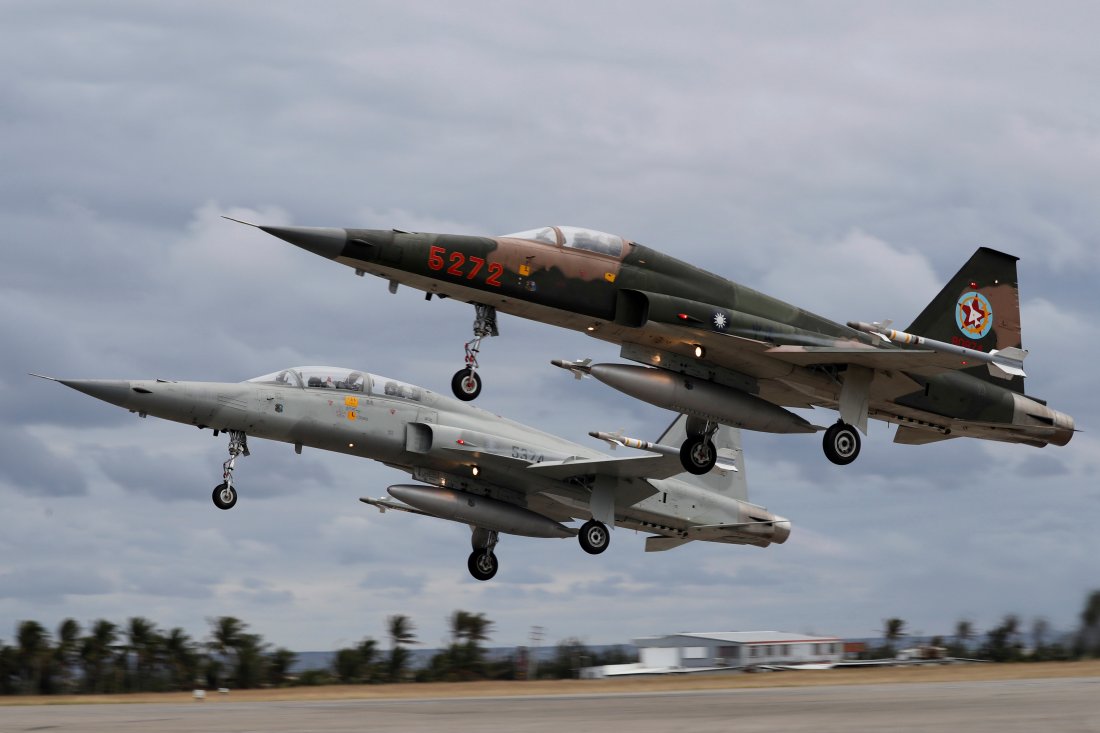US approves $330m arms sale to Taiwan
By Edward White and Kathrin Hille in Taipei
The US has approved a $330m arms sale to Taiwan, in a fresh sign of Washington’s support for the government in Taipei amid rising Chinese pressure on the country and growing tension between the Trump administration and Beijing.
The proposed deal, which covers parts for Taiwan’s F-16, C-130, F-5, Indigenous Defense Fighter and other aircraft systems, also comes against a backdrop of an escalating US-China trade war.
The sale would contribute to US national security by boosting Taiwan’s defensive capability, the Pentagon’s Defense Security Cooperation Agency said in a statement, adding that Taiwan “continues to be an important force for political stability, military balance and economic progress in the region”.
A spokesperson for the presidential office in Taipei said the US support would boost confidence among Taiwanese in the face of “severe” security challenges.
The sale, which is yet to be finalised, is the second US weapons agreement with Taiwan since President Donald Trump took office — it agreed a $1.4bn deal in June 2017 — and marks the latest sign of warming ties between Taipei and Washington.
The two do not have formal diplomatic relations but maintain close economic and security links despite opposition from Beijing.
It is a sign that “US arms sales to Taiwan are finally becoming normal again”, said Ian Easton, a research fellow at the Project 2049 Institute, a US security think-tank, and the author of a book on the threat of a Chinese invasion of Taiwan.
US law provides for the sale of weapons to Taiwan but, in the latter years of the presidency of George W Bush, Washington dropped annual sales in favour of bundling requests every few years.
The move was an acquiescence to China’s opposition.
Mike Pompeo, US secretary of state, and Randall Schriver, the US assistant secretary of defence for Asian and Pacific security affairs, were among those who lambasted the Obama administration for delayed weapons sales.
Mr Pompeo opposed former president Obama when he was a congressman, and Mr Schriver when he was the head of the Project 2049 think-tank.
Officials in Taipei and people familiar with the issue in Washington believe it is likely the Trump administration will return to the routine sale of weapons to Taiwan.
While the most recent deal “moved faster than others in the past”, it did not represent “any significant increase in Taiwanese capability”, said Lauren Dickey, a Washington-based Taiwan analyst and a researcher at King’s College London.
The rapid modernisation of the China’s military, Beijing’s increasing international clout and Washington’s slowdown in approving Taiwan’s arms deals have all skewed the military balance increasingly in the mainland’s favour.
Taiwan’s ageing fleet of fighter aircraft and its navy have suffered the brunt of the consequences: Washington failed to decide on Taiwanese requests for next-generation planes and the procurement of diesel-electric submarines that were approved as long as 16 years ago stalled because the US lacked the relevant technology — American submarines have long been nuclear powered — and no other country dared approve the export out of the fear of angering China.
Earlier this year, Chinese fighter aircraft circled Taiwan airspace.
The “patrols” were publicised by the People’s Liberation Army with video footage of the island and boosted nationalist sentiment in China.
Taiwan’s President Tsai Ing-wen, second from left, inspects a Kidd-class destroyer during a navy exercise in the north-eastern port of Su’ao in Taiwan. Tsai boarded a navy destroyer to review military drills ahead of planned war games by rival China.
But some analysts said the main purpose was to bolster the country’s military competition with the US.
Circling Taiwan’s air defence identification zone allowed Chinese pilots to train on the route they would need to take to target US military bases in Guam with air-launched missiles.
China’s efforts to develop weaponry powered by artificial intelligence also presents new challenges to Taiwan.
“Their cyber capabilities and drones are clearly a threat,” said Alexander Huang, a professor at the Institute of Strategic Studies at Tamkang University.
He added that Beijing’s move to turn the J-7, an older version fighter aircraft, into an unmanned aerial vehicle could give China a tool to “exhaust Taiwan’s air defences”.
Taiwan’s government has decided to strengthen its own defence industry capabilities, including a project to build the long delayed submarines domestically.
In addition, the president’s national security advisers are keen to improve its command and control infrastructure, as well as integrate it more closely with that of the US and Japan.
The military, however, would rather prioritise big-ticket purchases, such as dozens of mobile missile corvettes, naval minelaying capabilities and anti-air missiles.
Which strategy to follow in arms procurement in the coming years will be on the agenda when Taiwan’s deputy defence minister visits Washington in late October for the annual US-Taiwan defence industry conference, according to two government officials and one defence expert.
“The question now is based on what assessment the US will suggest” for arms procurement, said Mr Huang.
“If they assume that military conflict is imminent, they are likely to recommend we pour all resources into asymmetry,” he added.
This could mean countering the threat of a Chinese invasion by targeting Beijing’s vulnerabilities, for example, using cruise missiles to target large cities or missile launch infrastructure.
 New Trump arms deal for Taiwan: F-5 fighters take off during a military drill at an air base in Taitung, Taiwan
New Trump arms deal for Taiwan: F-5 fighters take off during a military drill at an air base in Taitung, Taiwan 
Aucun commentaire:
Enregistrer un commentaire